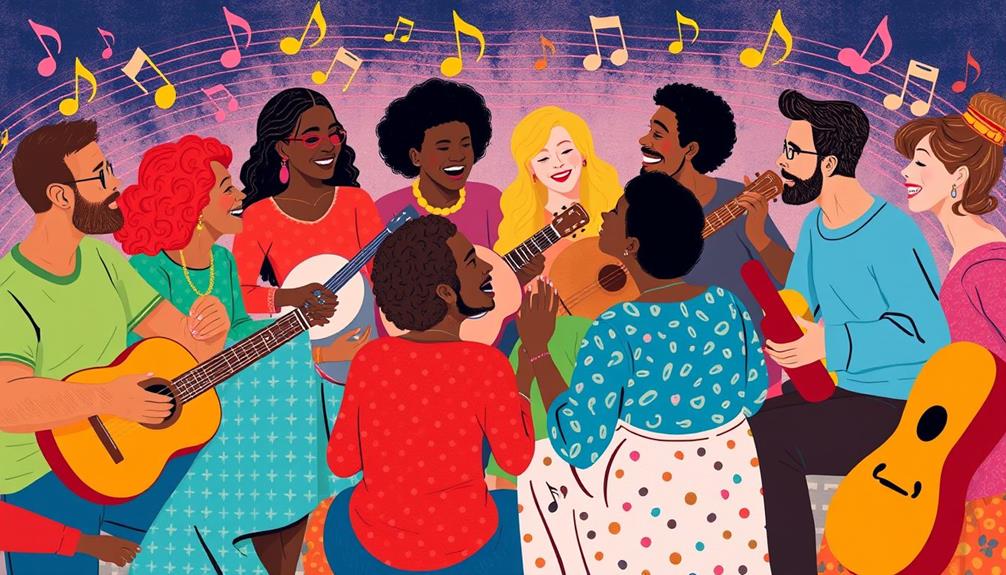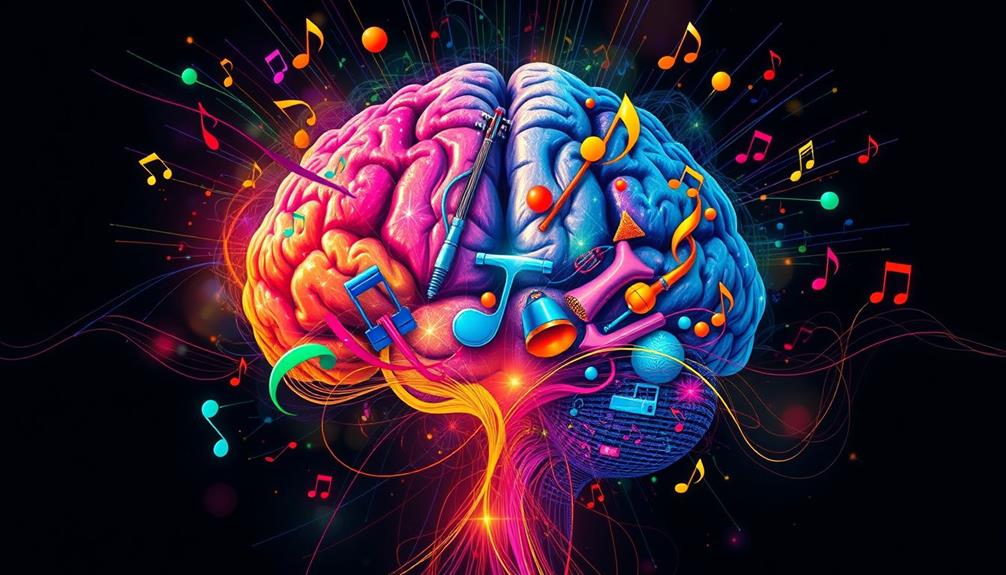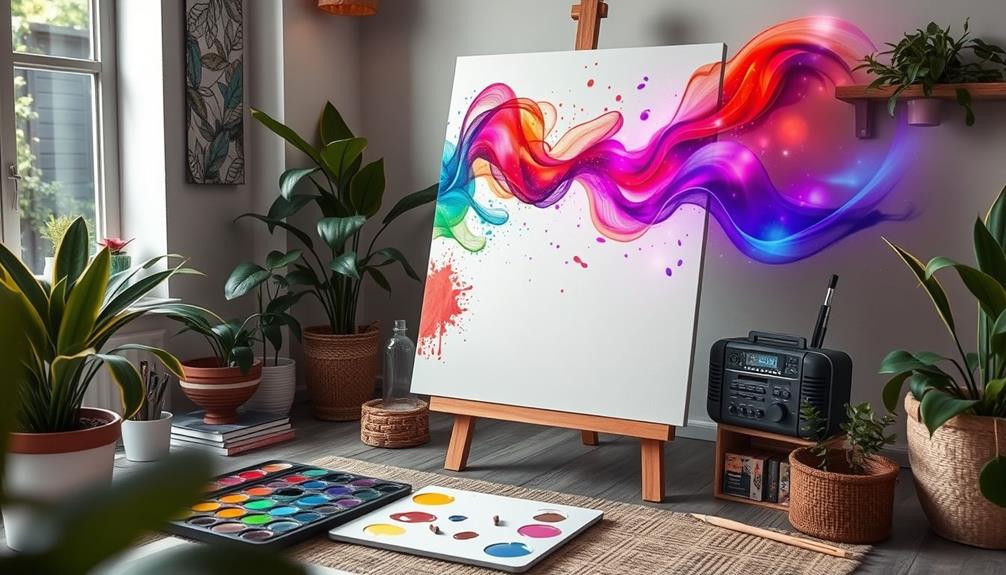Music therapy offers powerful benefits for your substance abuse recovery. It provides a unique outlet for emotional expression, helping you gain self-awareness and cope with cravings. Participants often report a significant boost in mental well-being, enhancing motivation to stay on the path to recovery. Engaging in group sessions fosters social connections, reducing feelings of isolation. Techniques like active music-making and lyric analysis help you reflect on your experiences and challenges. By integrating music with traditional therapies, you create a holistic approach to healing. To discover even more about how music therapy can support you, read on for additional insights.
Key Takeaways
- Music therapy enhances emotional well-being, with up to 70% of participants reporting improved mental health during recovery.
- It fosters emotional expression and self-awareness, helping individuals articulate feelings related to substance abuse.
- Group music therapy promotes social connections, reducing feelings of isolation and encouraging peer support.
- Techniques like lyric analysis and active music making equip participants with coping mechanisms for managing cravings and triggers.
- Regular assessments in music therapy ensure personalized approaches, adapting to individual needs and enhancing treatment effectiveness.
Overview of Music Therapy
Music therapy is a powerful tool in substance abuse recovery, utilizing music interventions to meet various therapeutic goals. This clinical approach addresses your physical, emotional, cognitive, and social needs through diverse techniques like active music-making, songwriting, improvisation, and lyric analysis. Each method fosters emotional expression and helps you develop essential coping skills during your recovery journey.
Additionally, incorporating elements of AI in music creation can enhance the therapeutic experience by providing personalized soundscapes and compositions tailored to individual needs.
Research shows that music therapy greatly reduces anxiety and improves mood, with up to 70% of participants experiencing enhanced mental wellbeing. By integrating music therapy into extensive treatment plans, you receive a personalized approach tailored to your preferences and recovery goals. This combination of traditional therapies and music interventions creates a holistic environment that promotes healing. This innovative approach not only addresses emotional and psychological challenges but also fosters a deeper connection to oneself and others. The benefits of music therapy extend beyond immediate stress relief, often aiding in the development of healthier coping mechanisms and improved emotional resilience over time. By embracing these therapeutic techniques, individuals can experience a transformative journey toward sustained mental wellness.
The roots of music therapy trace back to ancient cultures, but its modern applications are gaining recognition for their impact on emotional health and substance use disorders. As you explore this treatment option, you'll find that music therapy not only supports your recovery but also enriches your overall experience, helping you connect more deeply with yourself and others.
Embracing this therapeutic approach can lead to a more fulfilling recovery process.
Key Benefits for Recovery

Harnessing the power of music therapy offers numerous benefits that can greatly enhance your recovery journey. First and foremost, it provides an effective outlet for emotional expression, helping you articulate complex feelings that may arise during substance abuse recovery. This process can lead to improved emotional regulation and self-awareness.
Participants often report a notable boost in emotional well-being, with enhancements of up to 70%, which can increase your motivation and engagement in recovery efforts. Additionally, integrating AI-driven solutions can help tailor music therapy sessions to individual needs, optimizing the therapeutic experience.
Moreover, music therapy promotes anxiety reduction by fostering relaxation and lowering cortisol levels, making it easier for you to manage stress, especially in the early stages of recovery. Engaging in group music therapy also fosters social connections and peer support, which are essential for combating loneliness and enhancing your sense of belonging within recovery communities.
Additionally, music therapy equips you with valuable coping mechanisms to manage cravings and triggers. By distracting you from negative emotions and promoting positive mood states, it ultimately supports relapse prevention.
Embracing these benefits can notably elevate your emotional well-being and strengthen your commitment to a healthier, substance-free life.
Techniques and Approaches

Various techniques and approaches in music therapy can greatly enhance your recovery experience. One effective method is Active Music Making, where you engage in playing instruments, singing, or songwriting. This helps you express emotions and boosts self-awareness during your recovery from substance use disorders.
Additionally, engaging in creative expression through music can lead to improved self-image, much like how astrology shapes personal confidence for some individuals.
Another powerful technique is Guided Imagery with Music, which combines music listening with visualization. This facilitates relaxation and self-exploration, crucial for managing cravings and triggers.
Lyric Analysis encourages you to examine song lyrics, allowing for personal reflection on feelings and experiences related to addiction. This fosters emotional insight and processing.
Improvisation promotes spontaneous musical creation, enabling you to express yourself freely and build social connections with others in group settings.
Additionally, Music Listening employs carefully selected tracks to evoke emotional responses, aiding in emotional regulation. This contributes to reduced anxiety and improved mood, essential components in your recovery program.
Challenges and Considerations

Steering through the challenges of music therapy for substance abuse recovery requires careful consideration of individual triggers and emotional responses. Certain music genres and songs can serve as potential triggers for past substance use, so it's essential to select music thoughtfully during therapy sessions to avoid any adverse reactions.
Understanding how feline behavior can influence emotional connections may provide insights into emotional responses to music, as both involve complex emotional attachments. Emotional responses to music vary widely; some might experience increased aggression or negative feelings, which could lead to discontinuing therapy.
To guarantee the best outcomes, music therapy needs to be conducted by licensed music therapists who can implement customized approaches tailored to your unique needs. This therapy shouldn't stand alone; it's most effective when integrated with other therapy modalities, addressing substance use disorders thoroughly.
Regular progress assessments are critical to monitor your journey, helping therapists adapt the treatment as needed. This ongoing evaluation guarantees that the therapy remains relevant and effective for you, promoting a smoother recovery process.
Implementation in Treatment Programs

Music therapy has become an integral part of many substance abuse treatment programs, acting as a complementary intervention that enhances traditional therapies.
Healthy lifestyle blogs often highlight the mental health benefits of music, which can further support your recovery journey. Here are some key benefits of implementing music therapy in your recovery journey:
- Engagement: Individualized sessions keep you motivated and actively involved in your treatment.
- Emotional Expression: Music provides a safe outlet for expressing complex emotions often tied to substance abuse.
- Social Support: Group therapy sessions foster a sense of community, reducing feelings of isolation and loneliness.
- Expert Guidance: Qualified music therapists tailor interventions to meet your specific needs, ensuring effective support.
Incorporating music therapy into your treatment program can greatly improve your recovery experience.
These sessions are usually tailored to your preferences, allowing you to connect with the music that resonates with you.
Both group and individual formats are available, enabling you to benefit from social interaction while receiving personalized attention.
Continuous assessment and evaluations help adjust therapy methods, ensuring you get the most out of your treatment.
With a focus on mental health and emotional well-being, music therapy contributes to thorough care, making your path to recovery more holistic and fulfilling.
Frequently Asked Questions
How Does Music Help in Recovery?
Music helps you express emotions and connect with others, creating a supportive environment. It reduces stress and improves focus, offering coping strategies for cravings and triggers, ultimately enhancing your overall well-being during recovery.
What Are the Benefits of Music Therapy?
You'd think music's just for entertainment, right? But it actually boosts emotional well-being, reduces stress, fosters connections, and teaches coping skills—making it a powerful tool for anyone looking to enhance their overall life experience.
What Is the Role of Music Therapy in Rehabilitation?
Music therapy plays an essential role in rehabilitation by helping you express emotions, reduce anxiety, and foster connections. It equips you with coping skills, enhances motivation, and ultimately supports your journey toward lasting recovery.
Why Is Listening Important in Addiction Recovery?
Listening's essential in addiction recovery because it helps you process emotions, reduces anxiety, and boosts mood. It also offers distraction from cravings and fosters connections with others, enhancing your overall support system during the healing journey.
Conclusion
Incorporating music therapy into substance abuse recovery is like adding color to a black-and-white painting—it brings life and vibrancy to the healing process. By tapping into the emotional and psychological benefits of music, you can enhance your recovery journey, fostering connection, self-expression, and resilience. While challenges may arise, the positive impact of music therapy can be profound, providing you with essential tools to navigate the path to lasting recovery. Embrace the rhythm of healing!










